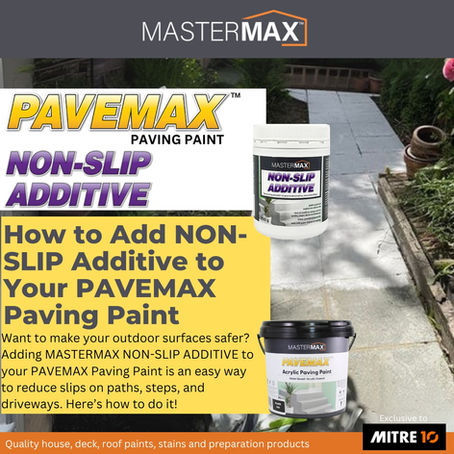
[ PAVEMAX Colour Chart ][ Product Information ][ Reviews ]

Acrylic Paving Paint
Protects and beautifies walk-on surfaces. A tough, water-based, acrylic
enamel paint with excellent performance and durability.
A fast-drying finish coat, undercoat and primer with a satin finish
IDEAL FOR USE ON: Concrete or timber floors and paving areas, paths,
steps, decks, verandas, laundry and bathroom floors. Add MASTERMAX
Non-Slip Additive to provide a safe, textured walking surface.
PAVEMAX is designed for foot traffic and areas subject to occasional through traffic only. It is not suitable for garage floors, driveways or in severe environments such as chemical plants or steel wheeled traffic areas. PAVEMAX Clear is not suitable for use on Timber.
Refer to our Tech Data sheet for more detailed information.

Protects & beautifies walk on surfaces!
-
Suitable for concrete* or timber floors and paving areas like paths, steps, paving, decks, verandas, residential workshop floors*.
-
A tough, water based, acrylic enamel finish for exterior and interior walk on surfaces.
-
Finish coat, undercoat & primer.
-
Fast drying - can be walked on after overnight drying.
-
Dries to a satin finish with a high opacity giving excellent UV resistance and high durability.
-
Add AP Non-Slip Additive to PAVEMAX to provide a safe, textured walking surface.
-
Available in Test Pots, 1 litres & 4 litres
Get a Test Pot to check your choice of colour gives the result you want on the actual surface you are coating
PAVEMAX - Colour Chart
Colours shown on this website are a representation only.
Please refer to the colour board instore or try a test pot to confirm colour choice

Black Cat

Dark Rhino

Wolf Grey

Elephant Grey


Oyster Grey

Clear Gloss

Clear Satin
How To Guides and Advice


★★★★★ 5 out of 5 stars.
· 10 months ago
Acrylic enamel paving paint 4 litre clear satin
Great product, easy to apply, used with the recommended grit for slip proofing deck, worked a treat.
Annie Oamaru
Oamaru
★★★★★ 5 out of 5 stars.
· 11 months ago
Refreshed our tired messy verandah
Our verandah, which is also our entry way, is exterior ply that had previously had outdoor carpet glued onto it. Pavemax has now made our entranceway look fresh and tidy. Easy to apply and looks great after the second coat!
Esme
Auckland
★★★★★ 5 out of 5 stars.
· 2 months ago
Awesome
Use this for my concrete crafts. Love this finish 😊
Recommends this product
✔ Yes
Alexandria
Hamilton







